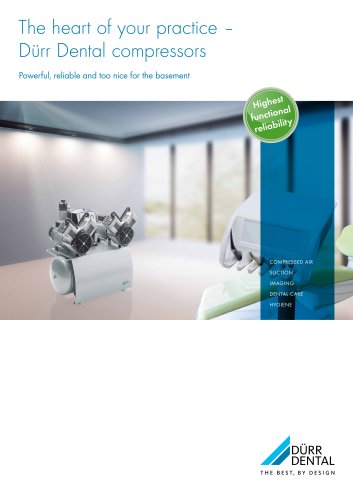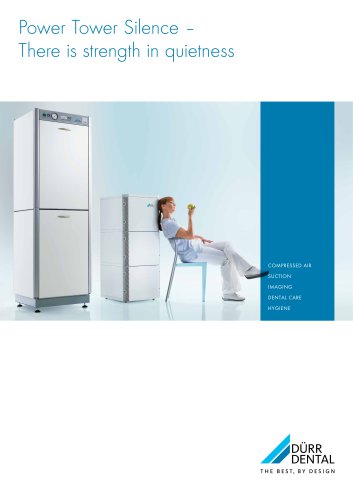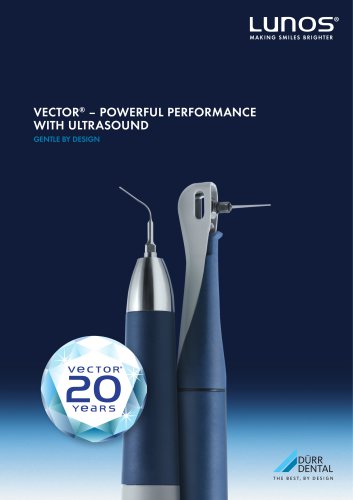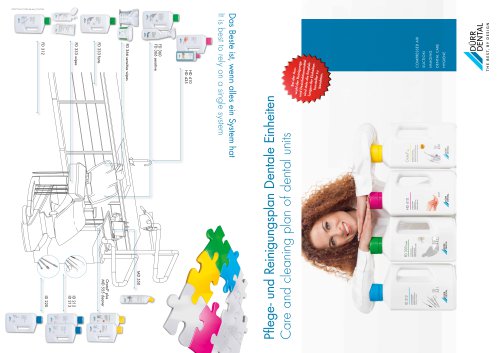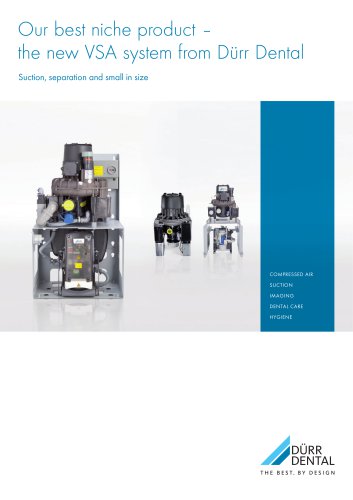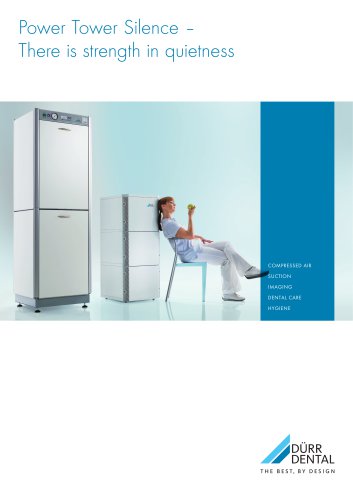
Excertos do catálogo

Why assured infection protection is so important. DURR DENTAL THE BEST, BY DESIGN
Abrir o catálogo na página 1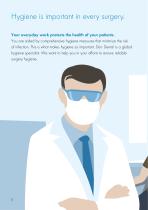
Hygiene is important in every surgery. Your everyday work protects the health of your patients. You are aided by comprehensive hygiene measures that minimize the risk of infection. This is what makes hygiene so important. Dürr Dental is a global hygiene specialist. We want to help you in your efforts to ensure reliable surgery hygiene.
Abrir o catálogo na página 2
Various germs can trigger infection and endanger health, particularly in the critical environment found in surgeries. Even if hygiene is often a matter of daily routine and is not always the object of direct attention, it is still the most efficient way of fighting against germs and preventing infection. This is why we want to help you to further increase your awareness of hygiene and find efficient hygiene measures together. We have developed this brochure in order to ensure the quality of your work in the long term. So that you and your patients always remain healthy.
Abrir o catálogo na página 3
Germs – the invisible risk. In order to stay healthy, you first need to be aware of the main causes of illness: Bacteria, fungi, and viruses. These are invisible to the human eye. But they’re all around us, including in your dental surgery! Many bacteria, fungi, and viruses are completely harmless to humans. But some can trigger dangerous infections. When infection occurs, various germs penetrate an organism, causing illnesses. They enter via our skin, mucous membranes, respiratory system, or skin injuries as contact infections, smear infections, or droplet infections. We would like to...
Abrir o catálogo na página 4
Fungi Like bacteria fungi are a form of life. And here, too, there are harmless types. However, there are some medically relevant fungi that can cause infection diseases called mycoses. A distinction is made between dermatophytes – which trigger skin diseases, mould fungi, and candida. The latter include Candida albicans, which afflicts the skin and mucous membranes and can result in septicaemia. Viruses In medicine, viruses are called infectious particles. Unlike bacteria and fungi, they aren’t usually considered to be living organisms. Among other reasons, this is because they do not have...
Abrir o catálogo na página 5
A critical environment. Dental surgeries are places with an increased risk of infection. Due to regular contact with blood, saliva, and secretions, germs can reach the human organism if protection measures are insufficient. There are various means of transmission: Via droplets, smear infection, or contact infection. This can happen directly from one person to another or indirectly via contaminated instruments, surfaces, and devices. Direct means of transmission – droplet infection Direct means of transmission – hands
Abrir o catálogo na página 6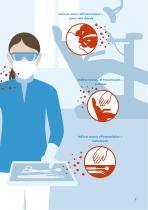
Indirect means of transmission – spray mist clouds Indirect means of transmission – surfaces Indirect means of transmission – instruments
Abrir o catálogo na página 7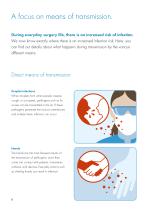
A focus on means of transmission. During everyday surgery life, there is an increased risk of infection. We now know exactly where there is an increased infection risk. Here, you can find out details about what happens during transmission by the various different means. Direct means of transmission Droplet infections When droplets form when people sneeze, cough, or just speak, pathogens such as flu viruses can be transmitted in the air. If these pathogens penetrate the mucous membranes and multiply there, infection can occur. Hands The hands are the most frequent means of the transmission...
Abrir o catálogo na página 8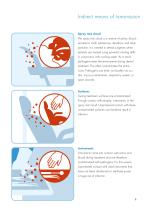
Indirect means of transmission Spray mist cloud The spray mist cloud is a mixture of saliva, blood, secretions, tooth substances, dentifrice, and other particles. It is created in dental surgeries when patients are treated using powerful rotating drills in conjunction with cooling water. As a result, pathogens enter the environment during dental treatment. This often contaminates the entire room. Pathogens can enter our bodies via our skin, mucous membranes, respiratory system, or open wounds. Surfaces During treatment, surfaces are contaminated through contact with people, instruments, or...
Abrir o catálogo na página 9
Protection against infection starts with prevention. Regular preventative measures ensure that the risk of infection is kept as low as possible. This protects the surgery team, patients, and the surgery’s equipment.
Abrir o catálogo na página 10
Detailed prevention measures. Prevention is the first step to efficiently reducing the risk of infection in everyday surgery life. Here, we show you which measures are particularly efficient and can quickly become part of your everyday routine. Surgery team ▪▪ Careful hand cleaning and disinfection is absolutely vital. This is because your hands are the most frequent means of transmission of pathogens. ▪▪ Protective clothing, gloves, goggles, and mouth-nose guards reduce the risk of droplet infection and direct/indirect contact infection. ▪▪ Vaccinations effectively minimize the risk of...
Abrir o catálogo na página 12
Patient ▪▪ The taking of an anamnesis – a detailed history of the patient’s state of health – can detect possible infection risks arising from the patient and allow appropriate measures to be implemented. ▪▪ Mucous membrane antiseptic rinses reduce the pathogens in the patient’s saliva, on the mucous membranes, and in the spray mist cloud significantly. Surgery ▪▪ The correct repeated preparation of used instruments – by means of disinfection, cleaning, packaging, steam sterilization and storage – considerably reduces the risk of infection. ▪▪ The regular maintenance of devices in...
Abrir o catálogo na página 13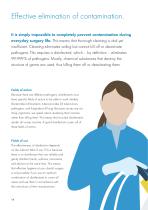
Effective elimination of contamination. It is simply impossible to completely prevent contamination during everyday surgery life. This means that thorough cleaning is vital yet insufficient. Cleaning eliminates soiling but cannot kill off or deactivate pathogens. This requires a disinfectant, which – by definition – eliminates 99.999 % of pathogens. Mostly, chemical substances that destroy the structure of germs are used, thus killing them off or deactivating them. Fields of action Because there are different pathogens, disinfectants must have specific fields of action to be able to work...
Abrir o catálogo na página 14Todos os catálogos e folhetos técnicos Dürr Dental
-
Brochure Compressors
12 Páginas
-
Power Tower Silence 200
1 Páginas
-
dsh
11 Páginas
-
OroCup
4 Páginas
-
VC 45
4 Páginas
-
Dosingplan
2 Páginas
-
DürrConnect
32 Páginas
-
VistaSystem
16 Páginas
-
VistaVox S
12 Páginas
-
VistaCam iX
6 Páginas
-
Hygoclave 90
12 Páginas
-
Laboratory
8 Páginas
-
Brochure DBSWIN 5
6 Páginas
-
AR Marker
1 Páginas
-
Vista Pano S Ceph
12 Páginas
-
Brochure VistaScan Mini Easy
2 Páginas
-
Brochure Clinics
10 Páginas
-
Brochure Tyscor Pulse
6 Páginas
-
Tyscor V 2
10 Páginas
-
Hygoclave 30
4 Páginas
-
TFT monitor and mounting solution
2 Páginas
-
CA 4
2 Páginas
-
Tyscor Pulse
2 Páginas
-
V/VS suction system
18 Páginas
-
Hygopac
2 Páginas
-
Vector Scaler
4 Páginas
-
Duo Tandem Med
2 Páginas
-
VistaPano S
8 Páginas
-
Periomat Plus
6 Páginas
-
V 2400
2 Páginas
-
Brochure digital Xray
12 Páginas
-
PTS 200
2 Páginas
-
PTS 120
4 Páginas
-
Cannula brochure
6 Páginas
-
hygiene technology
14 Páginas
-
DSH range package
4 Páginas
-
Brochure System-Hygiene
16 Páginas
-
Brochure Vector
12 Páginas
-
Brochure VistaIntra DC
4 Páginas
-
Brochure Imaging
10 Páginas
-
Vector Paro
6 Páginas
-
Tornado
8 Páginas
-
V / VS / VSA 300 S
18 Páginas
-
CA 1
12 Páginas
-
General catalog
24 Páginas
-
Film developing
2 Páginas




